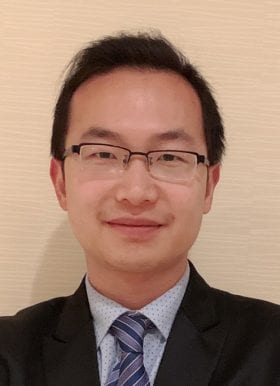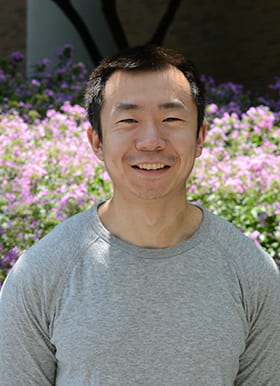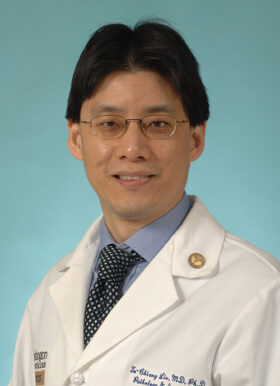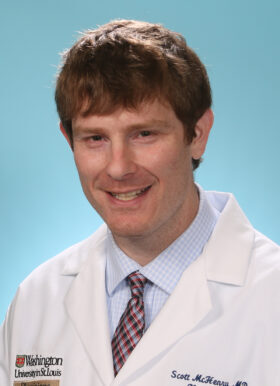First Year Awardees
Siyuan Ding, PhD
Assistant Professor of Molecular Microbiology

Division of Molecular Microbiology
Washington University School of Medicine in St. Louis
Title of project: Sensing of Enteric Viruses by Intestinal M Cells
(8/1/2020 – 7/31/2021)
Dr. Ding is an Assistant Professor in the Department of Molecular Microbiology. His funded project will aim to dissect the molecular mechanisms relevant to: 1) the role of M cells to enteric virus infection and diseases, and 2) the cell biology of M cell transcytosis and antigen presentation. His team will leverage state-of-the-art tools in genomics, proteomics, single-cell analysis, human intestinal enteroid culture to comprehensive interrogate intestinal M cell-enteric virus interactions. Conceptually, this study will tackle the molecular basis of M cell antigen presentation and its relevance to enteric virus infection. Dr. Ding’s results may also have broad implications for the clinical prevention and treatment for rotavirus infections and the rational design of M cell-targeted vaccines for improved mucosal immunogenicity and antigen delivery.

Ramon Jin, MD, PhD
Clinical Fellow/Postdoctoral Researcher
Division of Medical Oncology
Washington University School of Medicine in St. Louis
Title of project: Human-Derived Organoids to Study the Role of SOX2 and CDX2 in Barrett’s Esophagus
(8/1/2020 – 7/31/2021)
Dr. Jin is a Clinical Fellow/Postdoctoral Researcher in the Department of Medicine, Division of Medical Oncology. His funded project aims to use a novel human-derived Barrett’s esophagus organoid model to genetically manipulate expression of SOX2 and CDX2. Specifically in Aim 1, Dr. Jin will use this system to overexpress SOX2 by transfection of SOX2 expression plasmids and analyze the histologic and transcriptomic changes of these resultant organoids for esophageal and intestinal characteristics. Then in Aim 2, he will assess for the effects of CDX2 expression loss in BE. In these human-derived BE organoids, he will use CRISPR-Cas9 to knockout CDX2 expression and analyze the histologic and transcriptomic changes of these altered organoids for changes in esophageal and intestinal characteristics. Using this system, Dr. Jin will explore key development specification questions in BE by increasing expression of SOX2 and knocking out expression of CDX2. Together, these experiments will elucidate novel molecular pathways involved in BE maintenance, and may reveal novel therapeutic avenues for to treat BE prevent EA.

Ta-Chiang Liu, MD, PhD
Associate Professor
Department of Pathology & Immunology
Washington University School of Medicine in St. Louis
Title of project: LRRK2 Kinase Activity Modulates Smoking-Induced Panelth Cell Defects and Susceptibility to Colitis
(8/1/2020 – 7/31/2021)
Dr. Liu is an Assistant Professor in the Department of Pathology & Immunology. His funded project proposes that Paneth cell abnormality and increased colitis severity in Atg16l1 T300A-smoked mice are mediated through LRRK2 hyperactivity. His proposed studies will determine the link between LRRK2 kinase activity level in modulating Paneth cell abnormality and colitis severity.

Scott McHenry, MD
Assistant Professor of Medicine
Division of Gastroenterology
Washington University School of Medicine in St. Louis
Title of project: Mechanism of Nonalcoholic Fatty Liver Disease in Crohn’s Disease
(8/1/2020 – 7/31/2022)
Dr. McHenry is an Instructor in Medicine in the Department of Medicine, Division of Gastroenterology. His funded project proposes to test the hypothesis that there is a relative deficiency in the ileal-derived enterokine, fibroblast growth factor 19 (aim1). This was based on the observation that patients with prior ileal-resections were predisposed to NAFLD. For aim 2, Dr. McHenry will test the hypothesis that there are two distinct inflammatory states characterized by unique cytokine profiles that are playing either a protective or harmful role with regard to the development of hepatic steatosis. This hypothesis was based on the observation that patients with acute radiographic inflammation at the time of their MR enterography were protected against NAFLD while those without acute radiographic inflammation were at a marked increased risk for NAFLD even after adjusting for differences in body composition, weight changes and medications. Overall the proposed analyses will provide insights into the mechanisms behind why these otherwise lean patients are having pathologic amounts of hepatic steatosis and lay the foundation for specific therapies aimed at modifying these pathways.

Brigida Rusconi, PhD
Instructor in Pediatrics
Pediatrics—Gastroenterology
Washington University School of Medicine in St. Louis
Title of project: The Role of Sphingolipid Signaling in Early Life Mucosal Immune Establishment
(8/1/2020 – 7/31/2022)
Dr. Rusconi is an Instructor in Pediatrics in the Department of Pediatrics, Division of Gastroenterology. Her funded project will seek to fill the knowledge gap regarding early life mucosal immune development and dysbiosis by addressing the relevance of sphingolipids, mainly sphingosine-1-phosphate, in directing this intricate relationship.
Second year Awardees

Spencer Willet, PhD
Instructor in Medicine
Division of Gastroenterology
Washington University School of Medicine in St. Louis
Title of project: The Role of the Hippo Pathway in Gastric Homeostasis and Metaplasia
(8/1/19 – 7/31/21)
Dr. Willet is a Post-Doctoral Research Associate in the Department of Medicine, Division of Gastroenterology. His research project and training plan will focus on bioinformatics/biostatistics (for scRNA-seq, RNA-seq, and ChIP-seq), organoid culture, Helicobacter pylori infection, and High-content imaging. The studies proposed in his application will explore how gastric cell identity is controlled and perturbed in injury and disease.